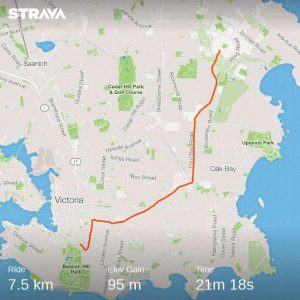
Above: an example of my route to UVic, as seen on the Strava App
Getting motivated to exercise has always been a problem for me. If I had a dollar for every excuse I’ve ever made to ditch a workout, I’d be moderately wealthy. So, when I made the resolution to integrate fitness into my busy life, I knew I’d need help. Enter Strava. Although I’d used one or two fitness apps in the past , I wanted a fresh start. So, I did a bit of Googling and found that a lot of people who run or bike to stay fit are using Strava. The first, and most important feature: it’s free. Yes, there is a membership you can purchase for $6/month that gives you extra features, but for my purposes the free version is more than enough. The second most important feature of Strava (and most fitness apps) is that it allows you to track your times, routes, and various activities, thereby giving you the opportunity to compete not only against yourself, but against other like-minded people in your area over time. It is these features that really motivate someone like me – I want to see how many km overall I can cover in a month, or how much quicker I can get to school or around Beacon Hill Park. Being able to actually see my progress and attempt to build on it is, for me, what pushes me out the door, away from all those convenient excuses. Here are some other great characteristics of Strava:
- You can use it on your phone or laptop
- Shows map images of your routes
- It’s basically social media for athletes – for example, you can follow people and vice versa, and give ‘kudos’ (Strava’s version of ‘likes’) and comments to posts on a person’s timeline
- Record and create routes, broken up into segments with fun names like “Oh, That Hill”, on which you compete against yourself or up to thousands of others who have completed that route or segment – sometimes famous athletes. And if you get a personal best or overall record on a route you get ‘awards’)
- On runs or bikes, elevation is measured, as are splits (broken up into miles or kilometers), distance covered, average speed, max speed, moving time, and max elevation
- Join online or local clubs, such as the UVic Cycling Club or Greater Victoria Trail Runners
- Enter Challenges, such as October 5k (see how fast you can run a 5k this month) or October Cycling Distance Challenge (see how far can you bike this month)
- Set weekly or yearly goals, and view weekly or yearly statistics
- Track what gear you used. as well as the amount of wear and tear on that gear so you know when it’s time to replace old gear
- Has an auto-pause setting, so you don’t get timed when your stuck at pesky traffic lights
- You can run it on your smart watch, which can then sync to your phone later on
So far I’ve really enjoyed using Strava, and feel it has helped me stick to my goal of integrating fitness into my busy life. Its intuitive design makes it easy to use, and I love seeing my routes and having the opportunity to try to best myself on bikes or runs! See below for a couple tutorials I find on Youtube:
Leave a Reply